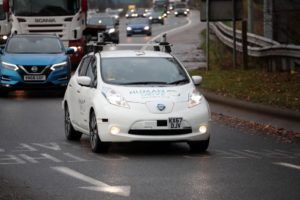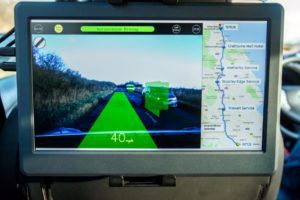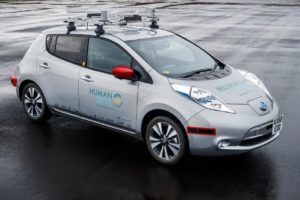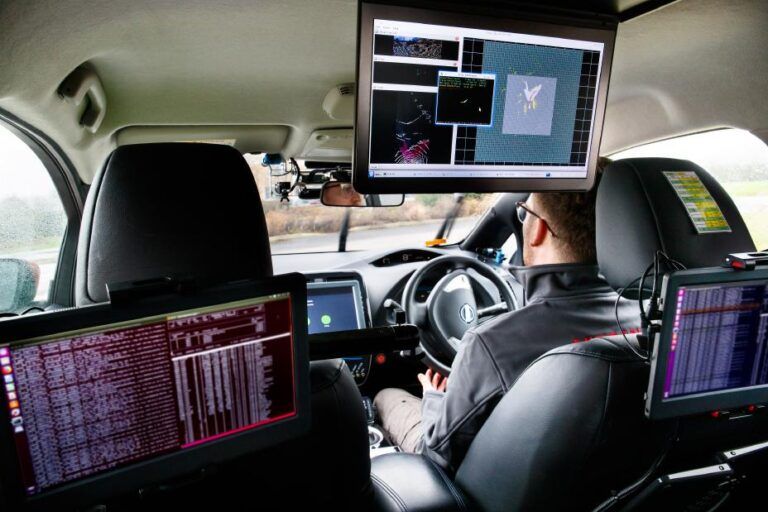The Government-backed HumanDrive autonomous vehicle (AV) research project has successfully completed the UK’s longest and most complex self-driving car journey on a 230 miles (370km) long self-navigated journey on public roads.
The £13.5m (US$17.5m) HumanDrive project was jointly funded by UK government through the Centre for Connected and Autonomous Vehicles (CCAV) and Innovate UK, and nine other consortium partners. The research project has successfully completed two trials: the 230-mile ‘Grand Drive’ self-navigated journey on UK roads using advanced positioning technology; and test track-based activity that explored human-like driving using machine learning to enhance the user experience. The test cars included Nissan LEAF electric vehicles (EVs), featuring GPS, radar, lidar and camera technologies that build up a perception of the world around it, allowing the system to make decisions about how to navigate roads and obstacles it encounters on a journey.
 The first element of the project was the ‘Grand Drive’ from Cranfield in Bedfordshire to Sunderland. The achievement was the culmination of 30 months’ work by a team led by Nissan engineers working in partnership with other HumanDrive consortium members. One of the key aspects of the project was to develop an advanced, autonomous vehicle control system that was put into practice in a range of driving scenarios to negotiate high-speed country lanes with no or minimal road markings, white lines or kerbs, complex junctions and roundabouts, and motorways. The autonomous technology activated along the route to change lanes, merge and stop and start when necessary.
The first element of the project was the ‘Grand Drive’ from Cranfield in Bedfordshire to Sunderland. The achievement was the culmination of 30 months’ work by a team led by Nissan engineers working in partnership with other HumanDrive consortium members. One of the key aspects of the project was to develop an advanced, autonomous vehicle control system that was put into practice in a range of driving scenarios to negotiate high-speed country lanes with no or minimal road markings, white lines or kerbs, complex junctions and roundabouts, and motorways. The autonomous technology activated along the route to change lanes, merge and stop and start when necessary.
The second part of the project looked at how machine-learning artificial intelligence (AI) technologies could enhance the user experience and passenger comfort of CAVs by making the systems feel human-like and natural. Pilot vehicles tested successfully on private tracks, also incorporated AI systems developed by fellow consortium member Hitachi Europe Ltd, which enable real-time machine-learning. By building a dataset of previously encountered traffic scenarios and solutions, it can use this ‘learned experience’ to handle similar scenarios in future and plot a safe route around an obstacle. These technologies were subjected to a robust testing process and developed using a range of facilities, including simulation, hardware in the loop, and private test tracks.
The consortium members were:
- Nissan – Lead partner and CAV development;
- Hitachi -AI to provide human-like control and perception;
- University of Leeds – Understanding humanistic driving and its application to AVs whilst also developing a driver risk model;
- Connected Places Catapult (CPC) – Project management, communications and marketing activity, dissemination and safety case elements;
- HORIBA MIRA – Provider of test facilities, supporting safety aspects;
- SBD Automotive – Cyber security support and AV Human Machine Interface (HMI) studies;
- Cranfield University – Provider of test facilities and supported AV demonstrations;
- Atkins Ltd – Provision of a Cyber Security Framework
- Aimsun Ltd – Studying the impact of AVs on the transport system;
- Highways England (HE) – Understanding the infrastructure needs for AV deployment.
“Safely completing the longest autonomous drive in Britain is an incredible achievement for the HumanDrive consortium, and a huge step towards the rollout of driverless cars on UK streets,” commented UK Business Minister, Nadhim Zahawi. “This project is a shining example of how the automotive industry, working with government, can drive forward technology to benefit people’s mobility – while helping to slash carbon emissions.”





